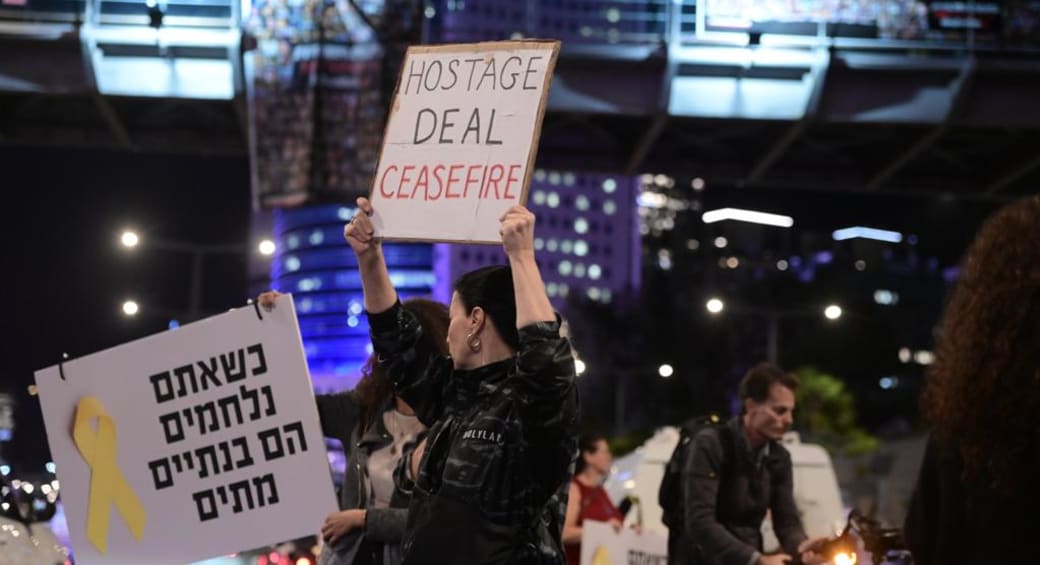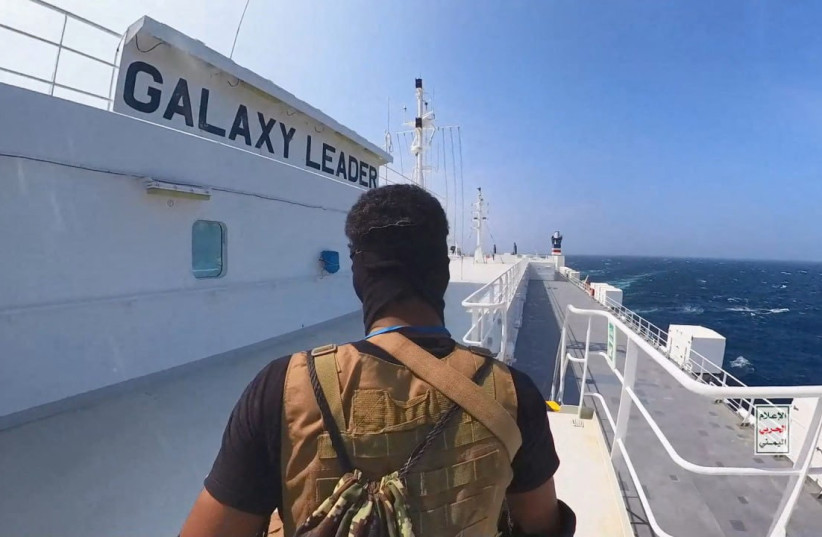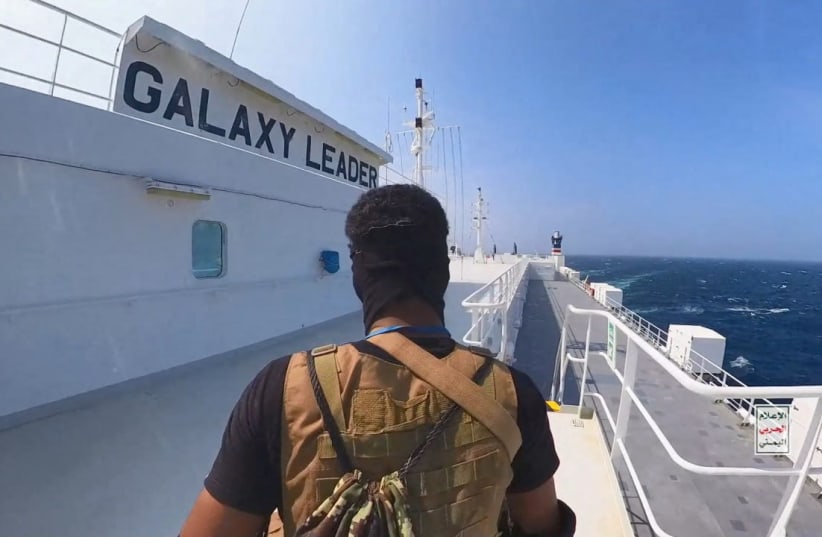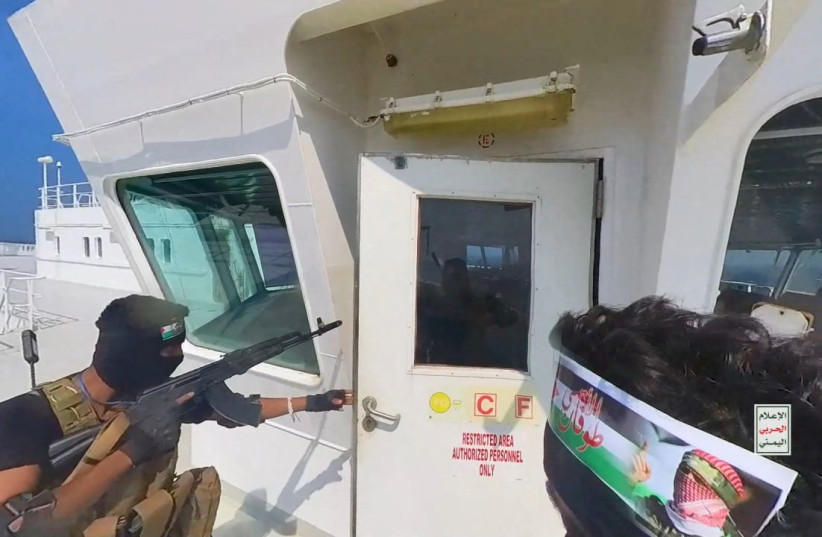Israel at war: What happened on day 46?
IDF kills three Hamas commanders as Gaza operations continue • Israel proves Hamas took hostages into Al-Shifa Hospital

Amos Hochstein visits Israel in effort to prevent Hezbollah-IDF war
Houthis release video of ship seizure, US calls it flagrant violation of international law.
![U.S. Special Envoy Amos Hochstein meets with Lebanon's caretaker Prime Minister Najib Mikati [not pictured] in Beirut, Lebanon November 7, 2023 U.S. Special Envoy Amos Hochstein meets with Lebanon's caretaker Prime Minister Najib Mikati [not pictured] in Beirut, Lebanon November 7, 2023 (photo credit: REUTERS/MOHAMED AZAKIR)](https://images.jpost.com/image/upload/q_auto/c_fill,g_faces:center,h_537,w_822/564557)
President Joe Biden's energy security adviser Amos Hochstein visited Israel on Monday as the US pushed to contain the cross-border violence with Hezbollah on the IDF Israel’s northern border and the budding conflict with the Houthis in Yemen and the Jewish state.
Hochstein arrived on the 45th day of the Gaza war between the IDF and Hamas, after a visit to Lebanon and Qatar. He is expected to brief Israelis about his efforts.
“We don’t want to see this [Gaza] war escalate we don’t want to see it widen,” US National Security Council spokesperson John Kirby told reporters in Washington.
“We certainly don’t believe it’s in anyone’s interest to have a second front in the north,” he said, adding that the US is doing everything it can “to prevent that scenario from happening.”
Hochstein was in the region to speak with Lebanese and Israeli officials to prevent such an escalation, he said, as a Hezbollah rocket damaged an IDF base in the north.
Galaxy leader seizure adds headache
The US has also moved additional “force posture” into the region to send a message to regional state and non-state actors not to widen the conflict, Kirby said.
He spoke one day after the Iranian proxy group in Yemen, the Houthis, seized the ship Galaxy Leader, which it believed was linked to Israel in the southern Red Sea. The group has threatened to hijack Israeli ships in the Red Sea and the Bab al-Mandeb Strait.
State Department spokesperson Matthew Miller told reporters in Washington on Monday that the ship’s seizure was a “flagrant violation of international law. We demand the immediate release of the ship and its crew and we will consult with our allies and UN partners as to appropriate next steps."
The Houthis have also been launching long-range missile and drone salvoes at Israel in solidarity with the Palestinian Hamas militants fighting in the Gaza Strip.
Prime Minister Benjamin Netanyahu blamed Iran for the attack.
Iran denied Israeli claims that it was involved in the seizure of the ship, which is actually British-owned and Japanese-operated cargo ship.
Two commercial ships that diverted their course in the Red Sea and Gulf of Aden were connected to the same maritime group whose vessel was seized by Yemen's Houthis, according to shipping data and British maritime security company Ambrey.
Japan's top government spokesperson on Monday confirmed the capture of the Nippon Yusen-operated ship Galaxy Leader, adding that Japan was appealing to the Houthis while seeking the help of Saudi, Omani and Iranian authorities to work toward the swift release of the vessel and its crew.cms

Two other ships also listed as commercially managed by Ray Car Carriers, Glovis Star and Hermes Leader, diverted their sailing routes on Sunday, Ambrey said on Monday.
The Hermes Leader had set a course to sail south of Nishtun in Yemen when it diverted its journey.
"The vessel continued to sail back to where it had come from, providing a new AIS destination as Hambantota, Sri Lanka," Ambrey said. "The vessel incurred a minimum four-day business disruption and sailed an additional 1,876 nautical miles."
The Glovis Star drifted for a number of hours in the Red Sea before continuing its journey, AIS ship tracking data showed on Monday.
Isle of Man registered Galaxy Maritime Ltd, which is the registered owner of the Galaxy Leader, said in a statement on Monday that the vessel "was illegally boarded by military personnel via a helicopter" on Nov 19.
When asked about the other two vessels diverting, a company spokesperson said it was not commenting further on "political issues."
US maritime administration MARAD in an advisory said the Galaxy Leader had been hijacked approximately 50 miles west of the Houthi-controlled port of Hodeidah, adding that ships should "exercise caution when transiting this area."
"We saw yesterday a new record - for the first time we saw (an) official announcement of pirates taking over a ship on the high seas, which I think is a major threat to international law and order," Israeli President Isaac Herzog said in comments on Monday, referring to the Galaxy Leader.
...
Houthis say they'll continue attacks until 'demise of Israel'
The Houthis claimed that they were not acting under a directive by Iran when they seized the ship.

A member of the political bureau of the Iran-backed Houthi terrorist movement warned that his movement would continue its attacks until the "demise of Israel" after the Houthis seized the Galaxy Leader in the Red Sea on Sunday, in statements to the Lebanese Al-Mayadeen TV on Monday.
Ali Al-Qahhoum, a member of the Houthi's political bureau, stated that the Houthis have been using drones and ballistic missiles with ranges of up to 2,000 km.
"We will not stand idly by in the face of the Zionist aggression against the Palestinian people and the international and American outcry in support of the entity," said Qahhoum.
Another member of the Houthi's political bureau, Muhammad Al-Bukhaiti, told Al-Jazeera that the terrorist group has "many options" to attack Israel if the war in Gaza doesn't end, warning that the conflict would expand if the war continues.
Bukhaiti added that the Houthis were not acting under a directive by Iran and that the group was trying to distract Israel and relieve some of the pressure on Gaza. The senior Houthi member additionally stated that the movement is willing to confront the US as well.

Deputy Chief of the Houthis' General Staff, Maj.-Gen. Ali Hammoud Al-Mushki, warned that the terrorist movement would continue to attack targets both in Israel and outside of Israel. "We are with the Palestinian people, and as long as the Zionist enemy continues its crimes and killing the people of Palestine, we will continue to stand against the Zionist enemy."
Houthis release footage showing seizure of cargo ship
Additionally on Monday, the Houthis released footage showing the seizure of the cargo ship.
مشاهد من العملية العسكرية النوعية للقوات البحرية التي تم خلالها السيطرة على السفينة الإسرائيلية يوم أمس في البحر الأحمر. pic.twitter.com/7dGNtbcMos
— العميد يحيى سريع (@army21ye) November 20, 2023
The footage was released by the movement's TV channel Al Masirah a day after the ship was hijacked by the Iran-backed group, who said the ship was linked to Israel. Israel, however, says the seized ship was British-owned and Japanese-operated.
The footage showed Houthi terrorists landing a helicopter on the ship and Houthi ships surrounding the vessel.
The owner of the Galaxy Leader said on Monday that the vessel was now in the Hodeidah port area in Yemen. "All communications were subsequently lost with the vessel," Isle of Man registered Galaxy Maritime Ltd, owner of the pure car carrier Galaxy Leader, said in a statement.
"The company, as a shipping concern, will not be commenting further on the political or geopolitical situation."
Two commercial ships that diverted their course in the Red Sea and Gulf of Aden were connected to the same maritime group whose vessel was seized by Yemen's Houthis, according to shipping data and British maritime security company Ambrey.
US denounces seizure of cargo ship
The United States on Monday denounced the seizure of a cargo ship in the Red Sea by Yemen's Iran-backed Houthi movement as a violation of international law and demanded the immediate release of the vessel and its crew.
"The Houthi seizure of the motor vessel Galaxy Leader in the Red Sea is a flagrant violation of international law," State Department spokesman Matthew Miller told a briefing.
"We demand the immediate release of the ship and its crew and we will consult with our allies and UN partners as to appropriate next steps."
Go to the full article >>Houthi provocations will need to be dealt with - editorial
In the post-October 7 world, the Houthis have emerged not as some distant threat but as a real and immediate one. Now is the time to take action.

Until the October 7 massacre and the ensuing war, the Yemen-based, virulently antisemitic Houthis were a distant threat to most Israelis.
Most people had heard the Iran-backed Houthis in the context of the ongoing civil war in Yemen but did not pay them much attention.
With Hezbollah in Lebanon, Hamas and Palestinian Islamic Jihad in Gaza and the West Bank, and Iran keen on setting up bases for proxies in Syria, Israel had closer, more immediate threats to worry about.
That was the thinking pre-October 7. In the post-October 7 world, however, the Houthis have emerged not as some distant threat but as a real and immediate one.

Since the beginning of the war, the Houthis have fired cruise missiles and attack drones toward Israel that have been shot down by the IDF, the US, and, according to some reports, even once by Saudi Arabia.
On Sunday, the Houthis struck again, this time not with missiles or drones in the air, but at sea, by hijacking a cargo ship en route from Turkey to India via the Red Sea.
A British company with an Israeli partner owns the Japanese-operated, Bahamas-flagged ship. There were 25 crew members on the ship from the Philippines, Bulgaria, Ukraine, Romania, and Mexico – no Israelis.
The Prime Minister’s Office released a carefully worded statement after the ship was seized.
“This is another act of Iranian terrorism and constitutes a leap forward in Iran’s aggression against the citizens of the free world, with international consequences regarding the security of the global shipping lanes,” the statement read.
There were four key words in this statement: “Iranian terrorism” and “international consequences.”
It made clear that Israel does not believe the Houthis acted on their own. The hands that hijacked the ship might have been those of the Houthis, but the motivating force came from Iran.
The statement made clear that Israel holds Iran responsible, and expects the rest of the world to do the same.
The second part of the statement spoke of “international consequences.” With these words, Israel was saying that although the hijacking may have been aimed at Israel, it is not a localized Israeli problem.
Threats to free shipping on international waterways – piracy, pure and simple – are a threat to the free world with “international consequences,” not only to Israel.
The next move
So, what actions should be taken?
First, the world should let Tehran know that it is not fooled by its shell game and realizes it employs proxies to commit acts of terror, targets Israel, and disturbs the world order.
Secondly, the US should immediately place the Houthis back on its list of foreign terrorist entities.
In the last days of former president Donald Trump’s term in office, then-Secretary of State Mike Pompeo placed the Houthis on America’s foreign terrorist organization list, a list that has symbolic importance as well as practical significance: anyone providing material support to such an organization is committing a crime.
A month later, just a couple weeks after Joe Biden took over as the American president, the State Department took the Houthis off this list, arguing that their listing was making it difficult to get humanitarian aid to Yemen, which was in the grips of a devastating civil war.
That was only, apparently, part of the story. The move was also aimed at Saudi Arabia, which the Biden Administration entered office believing should be kept at arm’s length, and a positive signal to Iran, with whom the new administration was interested in reengaging in nuclear diplomacy.
Now is the time for the US to reclassify the Houthis as a terrorist organization. This characterization seems very apt for a group that sends cruise missiles and attack drones toward civilian populations and hijacks commercial shipping vessels.
Right now, the Houthis are acting with impunity. Reinstating them on this list signals there is a price for their actions.
Israel, too, will eventually need to make the Houthis pay. The time to do this might not be now, in the midst of a full-scale war in Gaza, but it will come at a later date. Israel does not live in a neighborhood where enemies will refrain from attacking just because they are asked not to. A price needs to be extracted, but at a time and place and in a manner of Israel’s choosing.
Israel-Hamas War: What you need to know
- Hamas launched a massive attack on October 7, with thousands of terrorists infiltrating from the Gaza border and taking some 240 hostages into Gaza
- Over 1,200 Israelis and foreign nationals were murdered, including over 350 in the Re'im music festival and hundreds of Israeli civilians across Gaza border communities
- Israel stresses that no ceasefire will be reached without a "mass release of hostages"